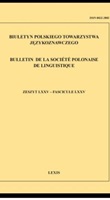Złożoność versus nieograniczoność – czy istnieją granice lingwistyki, interpretacji lingwistycznej, czyli określonego dyskursu naukowego?
Complexity vs. limitlessness – are there limits of linguistics, linguistic interpretation, i.e. limits of specific scientific discourse?
Author(s): Małgorzata Rzeszutko-IwanSubject(s): Historical Linguistics, Comparative Linguistics, Descriptive linguistics, Higher Education
Published by: Polskie Towarzystwo Językoznawcze
Keywords: interdisciplinarity; multiparadigmatism; complexity; accumulation; acceleration;
Summary/Abstract: This article attempts to answer the question whether there are limits to linguistics, to linguistic interpretation, i.e. limits to a specific academic discourse? The understanding of the term “discourse” adopted in this study is a reference to the theory of culture put forward by Fleischer and Labocha, in which discourse appears to be a cultural category. The adopted understanding of this concept also makes reference to the French School of Discourse Analysis. The concept of discourse is thus identified with the area of human socio-linguistic activity. In order to answer the title question the author of the article identifies three dimensions of academic discourse: cognitive (intellectual), biological and technological. In their context, the author refers to the problem of the limits of linguistics, limits of linguistic interpretation, i.e. the limits of a specific academic discourse. The multiparadigmatism of science, i.e. the multiplicity of research methods and conceptual frameworks describing the vision of the world, the variability of theories, and, therefore, the fact that academic discourse is a cyclical, emergent process with an open outcome, indicate, be it with undeniable limitations, the lack of limits of linguistics and the lack of limits of linguistic interpretation.
Journal: Biuletyn Polskiego Towarzystwa Językoznawczego
- Issue Year: LXXV/2019
- Issue No: 75
- Page Range: 127-139
- Page Count: 13
- Language: Polish

